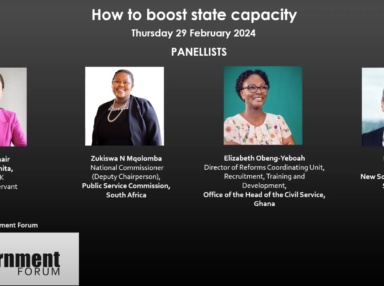Learning From Each Other: Developing Innovative Solutions for Global Challenges
As governments around the world, particularly in the Global South, face multiple uncertainties caused by a combination of global and local factors, finding the right solutions to problems has become a pressing issue. However, the solution is not as simple as copying best practices out of context.
Jelena Vidojević, co-founder of the New South Institute, has published an article on the Global Government Forum website offering insights on how governments can learn from each other in an inclusive and effective way to develop innovative solutions. Jelena argues that copying ‘best practices’ from the West can be counterproductive, as such practices often lack context and can lead to ‘isomorphic mimicry’. Instead, governments should take an open-minded approach, respecting different cultures and critically evaluating what works, while being creative in finding new solutions.
Jelena argues that effective solutions to complex social problems exist in the Global South and can be adapted and transferred to different contexts without losing their original value. However, this requires an understanding of the context and logic behind such solutions, which is often overlooked when simply copying best practices.
[…] copying “best practices” from the West can be counterproductive, as such practices often lack context and can lead to “isomorphic mimicry.” Instead, governments should take an open-minded approach […]
The term ‘best practice’ has become a buzzword that lacks clarity and precision and is heavily ideologically loaded. This often leads to the imitation of models and practices from the West, which are seen as a universal, normative ideal. This ‘isomorphic mimicry’ is one of the dangers of Eurocentrism. Ignoring policies and actions from outside the West and its spheres of dominance can be equally damaging. Governments in the Global South tend to defer to Western epistemic superiority, encouraged by the international development ecosystem’s engagement with Global South countries.
To move beyond mimicry, the New South Institute aims to develop a body of practical knowledge generated from the experiences of Global South governments, producing models of ‘good practice’ that are better suited to local contexts. The Institute recognises the critical role of intermediaries in enabling knowledge exchange and connecting different actors, such as think tanks and networks, across regions outside the West. Connecting geographically distant parts of the Global South and focusing on recent processes that have exposed similar failures can provide new insights and forms of cooperation and solidarity, giving a stronger, more independent voice to the search for alternatives.
Jelena’s full article on the GGF website is one of a series of posts by NSI researchers on the GGF website as part of a collaboration between the two organisations. If you’re interested in learning more about the challenges countries in the Global South face in learning the right lessons and developing effective policy innovations, it’s worth checking out.



